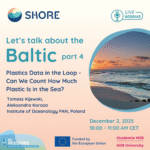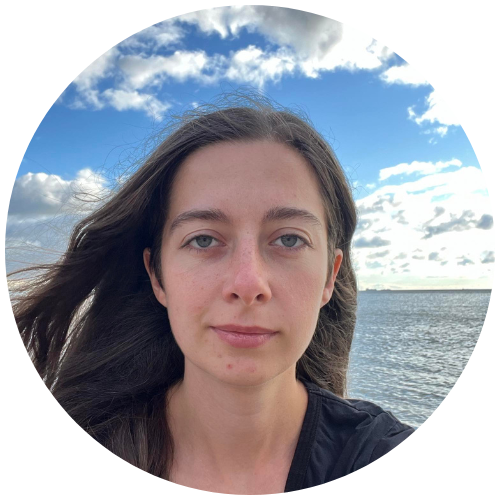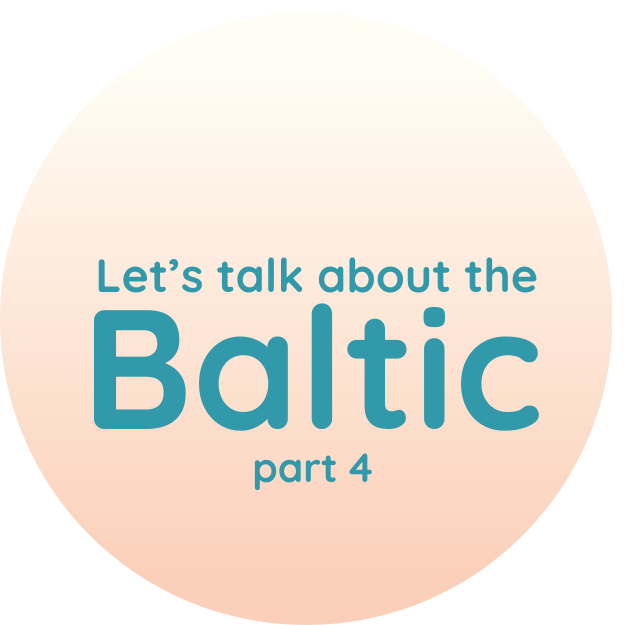
🎬 Let’s Talk About the Baltic Sea – New Episode!
Title: Loop – Can We Count How Much Plastic Is in the Sea?
Every day, we use plastic — bottles, bags, wrappers, even fishing nets. It makes life easier… but there’s a catch. Much of this plastic doesn’t just disappear when we throw it away. A big part of it ends up in our rivers and, eventually, in the sea. 🌊
Scientists estimate that around 80% of all plastic in the ocean comes from land! But how much plastic is really out there? What types of plastic float, sink, or hide in the sand? And how on Earth do we measure it?
To find out, researchers collect samples from beaches, seawater, ice, and even marine animals. Using special nets, microscopes, and chemical tools, they track down tiny pieces called microplastics — smaller than a grain of rice! These invisible fragments tell a big story about how our daily choices affect the ocean.
Why does it matter? Because the more we know, the better we can protect marine life — and reduce plastic pollution at its source.
Join the SHOORE Lectures to explore how scientists study plastic in the sea, what we’ve discovered so far, and how you can help protect our planet by using less plastic!
Let’s dive into the data — and into solutions!
Our Speakers:

Dr. Tomasz Kijewski, is a member of the Climate and Ocean Research and Education (CORE) Laboratory at the Institute of Oceanology of the Polish Academy of Sciences (IO PAN) in Sopot. Dr. Kijewski is a biologist specializing in marine fauna genetics. As a co-creator of the “Ocean of Changes” project (https://oceanofchanges.com), he is involved in educational activities, participating in or co-organizing numerous science festivals, picnics, workshops, and lectures for youth and adults. Tomasz is part of the team editing and producing the “Ocean Handbook” series of films and is the author of numerous scientific and popular science publications, as well as the author of the blog www.rybanapiatek.wordpress.com. (in polish).
Aleksandra Koroza, is a researcher at the Laboratory for Climate and Ocean Education and Research at the Institute of Oceanology of the Polish Academy of Sciences (IOPAN). She focuses on marine ecosystem services and various studies conducted within the laboratory that combine social sciences with ocean and marine research. She is also passionate about exploring the impact of anthropogenic pollution on marine mammals. Aleksandra earned her master’s degree at Bangor University in Wales, where she studied the effects of maritime traffic on the behavior of bottlenose dolphins in New Quay. She is a member of the international OYSTER network and co-organizes scientific conferences for children and youth, such as the International Sopot Youth Conference.

Register now and uncover the secrets of the Baltic!
📅 Date: December 2, 2025
⏰ Time: 10:00 – 11:00 AM CET
📍 Location: Online, Zoom Platform
💻 Registration Link: HERE
🎬 Curious about the Let’s talk about the Baltic webinars? They’re here! Our videos are ready — dive into the world of science and see how together we can care for our oceans!
First webirar: Let’s talk about the Baltic
Second webinar: Secrets of the Baltic Sea’s Biodiversity and the Extraordinary Life of Migratory Fish.
Third webirar: Are We Under Attack? Creatures of the Baltic Sea.
Webinars funded under SHORE project is a Mission Ocean and Waters project funded by the EU’s Horizon Europe research and innovation programme (Project number: 101112815).

